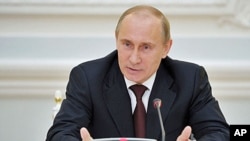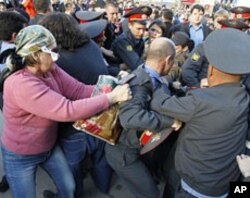On May 7, Vladimir Putin returns to the Kremlin to rule Russia as president. He inherits one of Europe's strongest economies. But he also faces a changed political reality - a better informed Russian populace that has learned to stand up to its leaders.
When Putin returns to Russia's presidency on Monday, he will inherit an economy that is the envy of Europe.
The government budget is balanced. Debt, inflation and unemployment are low. Reserves are high. And, the economy is growing at more than 4 percent - almost three times the level of Western Europe.
But this prosperity depends heavily on high oil and gas prices.
Anders Aslund, a Russia specialist at the Peterson Institute for International Economics, warns that Putin needs to diversify Russia's economy - and to save for drops in energy prices.
"Within the next two years, the oil price will peak out, if it hasn't already. Then we should expect a more moderate oil price. And, that means that he will have to economize," said Aslund.
Call for political freedom
For some Russians, high commodity prices have brought affluence. For others, the key is simply stability. And, with stability, they are asking for more political freedom.
Gleb Pavlovsky, a former Kremlin advisor, says Putin faces a different Russia than the one he ruled in 2008. That is the year he surrendered the presidency and became prime minister.
Pavlovsky says that Russia is no longer a virtual monarchy. The street protests of last winter popped the illusion that Putin is infallible.
In response to last December's protests, President Dmitry Medvedev announced political reforms.
Six months later, critics say one reform - direct elections for governors - has been changed to the point where the Kremlin will have veto power over candidates. A second reform - making it easier to register political parties - is splintering the opposition into dozens of little parties.
Konstantin von Eggert, a columnist for state news agency Ria Novosti, believes that civic movements will prove to be the building blocks for a more open political system in Russia.
"The current wave of protests was proceeded around 2006, 2007, 2008 or 2009 by a huge increase in charitable and voluntary activities among Russians, especially in the big cities," said von Eggert. "These were not supposed to be political things, and lots of these people were saying, you know we are not in politics, we just helping people who suffer from forest fires or orphaned children, or organizing gift collection for the homeless."
Changed political reality
This new sense of empowerment is creating a Russia that talks back to its leadership.
In mid-April, Putin visited Russia's Duma to give his last address as prime minister. When he made light of a mayoral candidate's hunger strike, an opposition group of deputies stood up and walked out.
Two weeks later, the candidate suspended his hunger strike after forcing central election authorities to admit widespread voting irregularities in his city, Astrakhan. Meanwhile, in three other major cities, opposition candidates were elected mayors in the last two months.
Russians now ask - will Putin be flexible enough to adapt to this new reality and serve to the end of his six-year term?
Pavlovsky, the former Kremlin aide says Putin is one of the most flexible politicians he knows. But he says that if Putin cannot reach out and build new partnerships and build a new political consensus, Russia will face a political crisis within a few years.
One topic that unites Russian people against the government is corruption.
Transparency International ranks countries on the perceived level of corruption, with the lowest score representing the worst corruption. Last year, Russia came in 143rd place, tied with Nigeria, also a major oil exporter.
In the fight against corruption, a blogger called Putin's ruling United Russia Party "the party of crooks and thieves." The label stuck, and last week, Putin handed leadership of the party to Medvedev.
"Russia is different in the sense that fear and hopelessness are gone from Russia. And, I think that they are gone for good," said the columnist Von Eggert.
Now, as Vladimir Putin starts a new six-year term in the Kremlin, the question is - can he stay on top of a more transparent, more pluralistic society?

